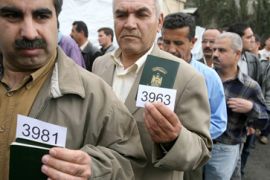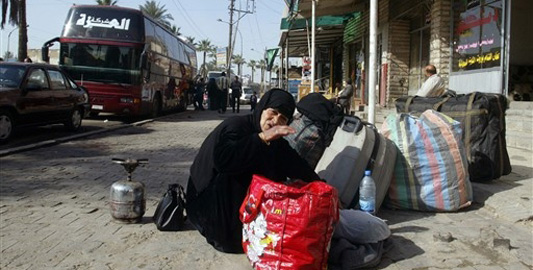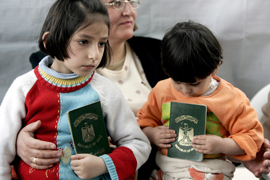Iraqis in Cairo struggle to rebuild
Displaced and distrusted, they long for the lives they once led back home.

 |
| An Iraqi woman waits for a bus bound for Syria. Many Iraqis are still trying to flee to Syria, Jordan, Egypt and Lebanon [AFP] |
Azhar Adnan turns his hands restlessly in his lap as he talks about his fall from middle-class comfort in Baghdad to poverty and instability in Cairo.
Once a political prisoner during Saddam Hussein’s rule, Adnan, a secular Shia, took a job in the Ministry of Finance in the months after the US invasion in 2003.
When the country’s reconstruction began to falter and the power of rival insurgent factions grew, he said he and others like him began to receive threats from all sides.
“Al-Qaeda sent me a threatening letter because I worked in the ministry,” he said. “Everyone who worked there was targeted.”
Secularists targeted
| The Iraqi refugee crisis since 2003 |
|
|
But Adnan was also persecuted for his religious lifestye.
“The Mahdi Army considered me an atheist because I am secular. They said I did not believe in God so I should be killed,” he told Al Jazeera.
“Then they called and said they were going to come and kill me.”
The deaths threats prompted Adnan and his family to leave Iraq and come to Cairo.
He has lived here since 2006 as a refugee with his wife, uncle and two cousins in Sixth of October City, a sprawling suburb that is home to many Iraqi refugees.
Cairo is one of the largest urban refugee centers in the world, and has for decades hosted people fleeing violence or persecution in the Horn of Africa and the occupied Palestinian territories.
No rights in Cairo
 |
| The UN estimates violence has displaced another two million within Iraq itself [EPA] |
The Egyptian government estimates that about 100,000 to 150,000 displaced Iraqis have settled in the country.
The number is small compared to Jordan and Syria, which together host more than 2 million, but many Iraqis who live in Cairo, including Adnan and his family, migrated in 2006 after Jordan stopped accepting refugees.
Others chose Egypt because of its relatively low cost of living, though restrictions imposed last January have since curbed their entry.
Egypt does not grant Iraqi refugees resident status and does not encourage them to put down roots here.
Iraqi children are not allowed to attend public school, say refugee rights advocates, and their parents cannot legally work. Researchers say that leaves them vulnerable to exploitative work in the informal economy and puts them at a greater risk of poverty and disease.
Adnan said he lives hand-to-mouth in Cairo. Without a steady income, his family cannot afford suitable health care or even buy medicine or leg braces for his wife, who suffers from polio.
“Life here is very hard,” he said. “Our biggest problem is that there is no way for me to work. We live off our savings and my uncle’s pension, but it is hardly enough.”
Moving beyond anecdotes
| In video | ||
|
Researchers say that problems like Adnan’s are common among Iraqi refugees in Cairo, but that it is hard to grasp the bigger picture of the community’s situation.
“We know almost nothing about Iraqi refugees in Egypt,” said Phillippe Fargues, chairman of the Department of Forced Migration and Refugee Studies (FMRS) at the American University in Cairo (AUC).
Of the more than 100,000 Iraqis estimated to be living in Egypt, fewer than 10,000 have registered with the United Nations High Commission for Refugees, Fargues added.
Furthermore, these government estimates are based on the number of Iraqis who have entered the country since 2006 at Cairo Airport, which Fargues said is an inadequate measure. “People move back and forth and we have no way to estimate that.”
AUC will conduct the first census of Iraqi refugees in Cairo this spring. It will focus on refugees’ social class and family structure, religious sect, personal history, the problems they have faced in Egypt and their plans for the future.
“We need to know the size of the community and the magnitude of the problems they encounter before we can have policies to solve their problems,” Fargues said.
“Personal stories and rumors do not give an accurate picture, especially from a policy-making point of view.”
But for now, personal stories and rumors provide the only picture of Iraqi life in Egypt’s teeming capital.
Distrust and disorganisation
But Mike Kagan, a professor of international law at AUC, says local government treatment of Iraqis and the sectarian divisions among the refugees themselves have stunted the growth of Iraqi organisations.
“Other refugee communities have a much longer history in the country, and international organisations and aid workers get to know them through their community leadership,” he said.
“Iraqi refugees are harder to get to know because there is little internal organisation, largely due to government pressure and distrust among Iraqis.”
“The question is, is there an Iraqi community, or are they many Iraqi communities?”
Hassanein, a refugee who asked to be identified only by his first name, understands all too well the deep unease that many Iraqi refugees feel around each other.
After fleeing the violence of their homeland, often leaving loved ones behind, the displaced find it hard to trust one other again, he said.
Sensitive subjects
 |
| Distrust and violence back home means Iraqis abroad have little community assistance [EPA] |
Hassanein came to Egypt a year ago, after militants in his neighbourhood discovered that he had a job with a US firm inside the Green Zone. Gunmen opened fire on his car as he drove home from the barber shop one day, only a week after his wedding.
He narrowly escaped, but said he “knew that Iraq was no longer the place for me”.
He and his wife came to Egypt, where their son was born. But it was impossible to support all three of them in Cairo without a steady income, so after several months his wife and child returned to live with family in Baghdad.
Concerned about their safety, he is always careful when talking with other refugees about his reasons for fleeing.
“If you have some money or have ever worked with the Americans, then you don’t want anyone back in Iraq to know that,” he said. “People here can’t tell each other their stories easily.”
“I still have family in Iraq, so I don’t trust anyone. I feel like I can’t talk to any Iraqis about my life.”
“I would never join any Iraqi organisation here. I don’t think anyone else would either.”

